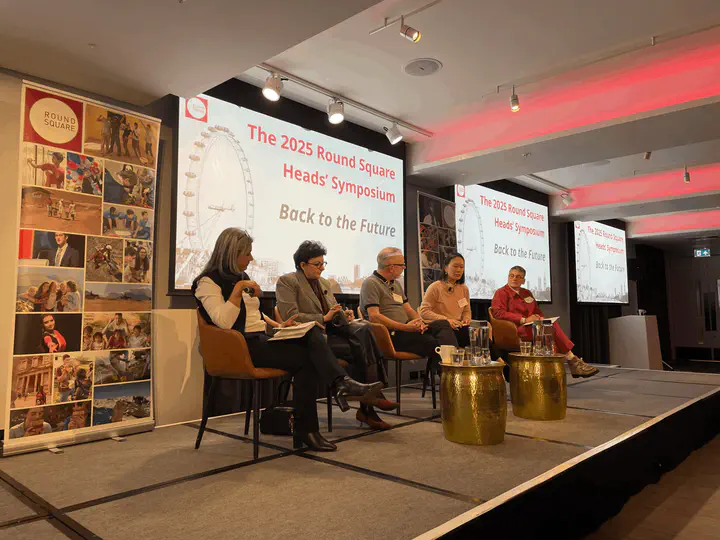Panel at the Headteacher's Symposium

2025 begins with a landmark event hosted by Round Square, a partner non-profit organisation of Oxford CCAI.
This Headmaster’s Symposium brought together around 150 School Heads in the audience from around 40 countries. Jun was joined by Professor Martin Compton from KCL, Carla Aerts and Julia Hobsbawm (OBE), to provide a lively discussion about the potential impacts of bringing AI-based technologies to education.
Resonating strongly with the perspectives raised by Julia, Jun stressed the importance of achieving a balance between children’s development of autonomy and creative thinking and the new opportunities presented in the age of AI. Many of the heads in the audience agreed that AI cannot replace in-person teaching, which is underpinned by a wealth of personal knowledge and experience, and uniquely strengthened by the personal connections that can be built between an educator and a pupil.
During the follow-up break-out session, Jun provided a short presentation to unpack how datafication and algorithmic computations can potentially influence children’s experiences with AI-based technologies, leading to unanticipated consequences. This contributes to many of the issues we regularly discuss, such as screen time addiction or exposure to harmful content. It can also result in children being exposed to overly personalised educational content without educators or pupils fully recognising how the personalization is generated, to what extent it is consistently presented with their best interests at heart, and how confident we can be that these personalised learning supports will indeed benefit their learning outcomes, particularly in developing their critical thinking abilities.
It has been encouraging to see how the headmasters present in the break-out session shared their own experiences of adopting AI-based technologies in their schools and the kinds of difficulties they have been facing. While the heads come from different parts of the world, there has been a consensus in the room regarding the lack of guidance on how to choose these technologies. Teachers felt that they are not always fully convinced of the benefits of such technologies, and their concerns and voices are often not included in the policymaking process. It has been an amazing experience to hear and learn about teachers’ perspectives, and to recognise how much more work could be done by amplifying their participation in the research process.
Lots of the discussions here are informed by our research on agency by design and will provide valuable inputs to our new UKRI project chaild.